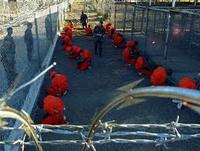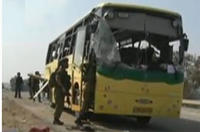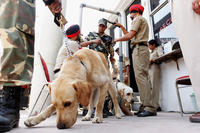-
Cyber attacks on critical infrastructure reach U.S.
Most of the U.S. critical infrastructure is run by computers which are connected to the Internet; this makes them susceptible to cyber attacks; a few days ago, the control system of a water pump in Illinois was taken over by a hacker’s remote command, and then deliberately destroyed; what critical infrastructure facilities will hackers – nerdy teenagers, terrorists, or intelligence operatives of other nations – target next?
-
-
U.S. investigates Illinois pump failure as cyber attack on infrastructure
The U.S. government is looking into the possibility that a cyber attack may have been responsible for the failure of a water pump at a public water district in Illinois last week; such an attack would be worrisome because cyber attacks on businesses are commonplace, but attacks that invade industrial control systems and intentionally destroy equipment are unknown in the United States.
-
-
Senate reaches deal on custody over terrorism suspects

On Tuesday several Senators from the Armed Services Committee reached an agreement on the controversial handling and prosecution of suspected terrorists; the agreement, struck by Senator Carl Levin (D-Michigan) and Senator John McCain (R-Arizona) would allow the military custody of all suspected terrorists except when the administration makes “a national security determination” to keep the detainee in civilian custody
-
-
Texas man convicted of terrorism charges

On Wednesday a Texas man, who had been in contact with the radical cleric Anwar al Awlaki, was convicted of attempting to provide material support to al Qaeda in the Arabian Peninsula (AQAP); Barry Walter Bujol Jr. was arrested when he boarded a ship at the Port of Houston, which he was led to believe was bound for Algeria where he would stay at an al Qaeda safe haven before heading to Yemen
-
-
DHS warns terrorists targeting buses

In a recent Transportation Security Administration (TSA) security bulletin, officials warned state and local authorities that terrorists are increasingly targeting bus networks; John Pistole, the head of the TSA, explained that bus networks are attractive targets for attacks because of their “accessibility” and their “open architecture”
-
-
Good ratings for TV drama "Homeland"
The first six episodes of “Homeland,” the Showtime series focusing on the U.S. fight against terrorism ten years after the 9/11 attacks, have been pulling very good ratings. The series is based on an Israeli drama called “Kidnapped.”
-
-
Training mission showcases Israeli counterterrorism techniques
A group of U.S. law enforcement officials recently concluded a weeklong training seminar on the methods Israel uses to prevent and respond to terrorism
-
-
Highly-trained Indian K-9s join counterterror forces

The Indo-Tibetan Border Police (ITBP) has a highly-trained unit in its force unlike any other in the world; police handlers have taught six Labradors to carry explosives in their teeth, sneak into terrorist lairs, plant remote-controlled bombs, hide secret cameras, interpret body language, and understand English and Hindi
-
-
Cyberterrorism - The weapon of choice a decade after 9/11
Scott Schober, the president and CEO of Berkeley Varitronics Systems, warns of the growing threat from cyberterrorists; he writes that in ten years, “the terrorists’ weapon of choice may not necessarily be a 187,000 pound 767 jet loaded with fuel targeting” New York’s skyline, instead it will be pajama-clad hackers taking down an electrical grid, causing mass confusion in the aviation system, or targeting a nuclear power plant’s SCADA control system to create mass panic and chaos for millions
-
-
Push for military tribunals for terrorists
Republican lawmakers in Congress are pushing to include a provision in the 2012 military authorization bill which would require that terrorists who are not U.S. citizens who are caught plotting against the United States, would be in military custody and face military tribunals, even if they are caught in the United States. The Obama administration opposes such a requirement.
-
-
Anwar al-Awlaki and the 9/11 plotters
Representative Peter king (R-New York) wrote to Lt. Gen. Ronald Burgess, director of the Defense Intelligence Agency (DIA), to inquire whether 9/11-related detainees being held by the United States are been interrogated about the possible role U.S.-born cleric Anwar al-Awalki, who was killed by a U.S. drone on 30 September, played in the 9/11 attacks.
-
-
U.S. expands drone war to Horn of Africa
Representative Peter king (R-New York) wrote to Lt. Gen. Ronald Burgess, director of the Defense Intelligence Agency (DIA), to inquire whether 9/11-related detainees being held by the United States are been interrogated about the possible role U.S.-born cleric Anwar al-Awalki, who was killed by a U.S. drone on 30 September, played in the 9/11 attacks.
-
-
Lawmakers seek to protect NY’s growing nanotech industry from terrorists
Last week during a Senate Judiciary Committee hearing, Senator Charles Schumer (D – New York) strongly urged DHS Secretary Janet Napolitano to secure New York’s growing nanotechnology industry against a Mexican terrorist group that has attacked nanotechnology firms around the world
-
-
Terrorism in Africa: Kenyan troops invade Somalia
On Wednesday, Kenya sent its troops some 100 miles inside Somalia to take the battle to the Islamic Al Shabaab organization, killing some 75 militants; yesterday, AU troops stormed a stronghold of Al Shabaab militant group on the outskirts of Mogadishu, while a militia backed by Kenyan troops simultaneously attacked another Shabaab stronghold along the Kenya-Somalia border, taking it over and forcing Shabab fighters to flee; Somalia’s nominal government relies on Ethiopian and Kenyan troops to fight Islamic terrorists in Somalia
-
-
FBI training elite deep-diving counterterrorism unit
To bolster its counterterrorism capabilities, the FBI has created an elite group of special agents trained to track terrorism underwater
-
- All
- Regional
- Water
- Biometrics
- Borders/Immig
- Business
- Cybersecurity
- Detection
- Disasters
- Government
- Infrastructure
- International
- Public health
- Public Safety
- Communication interoperabillity
- Emergency services
- Emergency medical services
- Fire
- First response
- IEDs
- Law Enforcement
- Law Enforcement Technology
- Military technology
- Nonlethal weapons
- Nuclear weapons
- Personal protection equipment
- Police
- Notification /alert systems
- Situational awareness
- Weapons systems
- Sci-Tech
- Sector Reports
- Surveillance
- Transportation
Advertising & Marketing: advertise@newswirepubs.com
Editorial: editor@newswirepubs.com
General: info@newswirepubs.com
2010-2011 © News Wire Publications, LLC News Wire Publications, LLC
220 Old Country Road | Suite 200 | Mineola | New York | 11501
Permissions and Policies
Editorial: editor@newswirepubs.com
General: info@newswirepubs.com
2010-2011 © News Wire Publications, LLC News Wire Publications, LLC
220 Old Country Road | Suite 200 | Mineola | New York | 11501
Permissions and Policies
